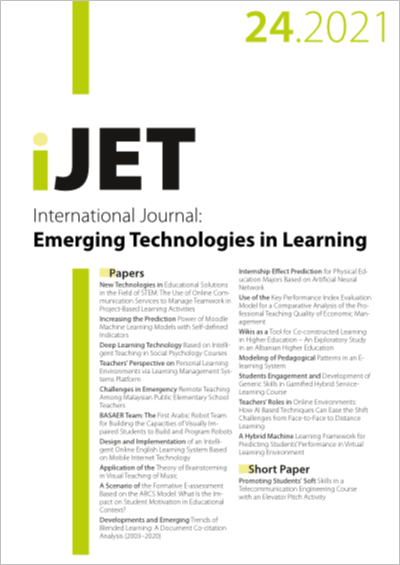Students Engagement and Development of Generic Skills in Gamified Hybrid Service-Learning Course
DOI:
https://doi.org/10.3991/ijet.v16i24.27481Keywords:
Gamification, students’ engagement, Advocacy, Hybrid Service-Learning, generic skillsAbstract
Hybrid Service-Learning, an emerging trend of combining co-curriculum course embedded with service-learning instructional strategies in online settings, has increasingly gained popularity, as many service-learning educators are moving into online platforms. The ongoing COVID-19 pandemic has accentuated its needs, thus forcing education systems worldwide to find alternatives to face-to-face instructions, one of them being Hybrid Service-Learning. This has prompted many researchers to attempt utilising gamification in online courses to increase students’ engagement. The purpose of this research was to report a gamified Hybrid Service-Learning (GAMYSEL) through students’ level of engagement proposed by Schlechty, used as a data classification to compare students’ scorings in their earning of points, badges, level and leaderboards. The results of the study indicated that, the students’ levels of engagement were relatively high through Advocacy Hybrid-Service Learning approach, where majority of them achieved the Strategic Compliance and Optimal Engagement categories. The students’ generic skills were further analysed with one-way repeated measures ANOVA and it was discovered that, GAMYSEL had positive impacts in developing these skills in five stages of service-learning. Both of these findings suggest that student’s engagement and generic skills had a significant effect on students learning after the use of GAMYSEL.
Downloads
Published
2021-12-21
How to Cite
Yusof, A., Atan, N. A., Harun, J., Rosli, M. S., & Abd Majid, U. M. (2021). Students Engagement and Development of Generic Skills in Gamified Hybrid Service-Learning Course. International Journal of Emerging Technologies in Learning (iJET), 16(24), pp. 220–243. https://doi.org/10.3991/ijet.v16i24.27481
Issue
Section
Papers
License
Copyright (c) 2021 AZIZAH YUSOF, NOOR AZEAN ATAN, JAMALLUDIN HARUN, MOHD SHAFIE ROSLI, Umi Mastura Abd Majid

This work is licensed under a Creative Commons Attribution 4.0 International License.



